U.S. tariffs impact on stock market
입력 2025.02.04 (00:24)
읽어주기 기능은 크롬기반의
브라우저에서만 사용하실 수 있습니다.
[Anchor]
The shock waves from the tarrif war ignited by U.S. President Donald Trump have hit our financial markets hard.
There are significant concerns that exports may be affected.
Our stock market, which had risen somewhat this year, has returned to square one, and the won-dollar exchange rate has fluctuated around the 1,470 won mark.
First, our Kim Ji-sook reports.
[Report]
The KOSPI is at 2,453 points.
It has dropped more than 2.5% compared to last Friday.
Although it rose nearly 5% in January, it has fallen over 80 points in the last two days, returning to the level of a month ago.
The impact of 'DeepSeek' combined with the shock of the 'tariff war' has become a significant negative factor for the stock market.
Large-cap stocks, particularly in semiconductors, secondary batteries, and automobiles, which have a high proportion of AI and exports, saw significant declines.
The chronic phenomenon of 'small gains' on good news and 'big drops' on bad news has repeated itself.
[Kim Young-hwan/NH Investment & Securities Senior Researcher: "(Korea's) three major export item-related stocks, and those with factories in Canada or Mexico, such as secondary batteries, seem to be significantly impacted."]
The 'tariff war,' which was thought to be a mere threat, has started quickly, and concerns that Korea may be included in the next round of tariffs are reflecting the worries about exports in the stock prices.
Foreign investors have sold a net of over 800 billion won, pushing the won-dollar exchange rate back up.
It has risen to the 1,460 won level for the first time in three weeks, even exceeding 1,470 won during trading.
[Min Kyung-won/Woori Bank Senior Researcher: "(Trump's tariffs) raise concerns about a global trade war, which makes it inevitable that the won, heavily reliant on exports, will be viewed negatively in the market."]
Asian stock markets, which are heavily reliant on exports to the U.S., were also shaken.
The Japanese Nikkei index fell by 2.6%, and the Taiwan Weighted Index dropped by over 3.5%.
China was closed for the Lunar New Year holiday.
This is KBS News, Kim Ji-sook.
The shock waves from the tarrif war ignited by U.S. President Donald Trump have hit our financial markets hard.
There are significant concerns that exports may be affected.
Our stock market, which had risen somewhat this year, has returned to square one, and the won-dollar exchange rate has fluctuated around the 1,470 won mark.
First, our Kim Ji-sook reports.
[Report]
The KOSPI is at 2,453 points.
It has dropped more than 2.5% compared to last Friday.
Although it rose nearly 5% in January, it has fallen over 80 points in the last two days, returning to the level of a month ago.
The impact of 'DeepSeek' combined with the shock of the 'tariff war' has become a significant negative factor for the stock market.
Large-cap stocks, particularly in semiconductors, secondary batteries, and automobiles, which have a high proportion of AI and exports, saw significant declines.
The chronic phenomenon of 'small gains' on good news and 'big drops' on bad news has repeated itself.
[Kim Young-hwan/NH Investment & Securities Senior Researcher: "(Korea's) three major export item-related stocks, and those with factories in Canada or Mexico, such as secondary batteries, seem to be significantly impacted."]
The 'tariff war,' which was thought to be a mere threat, has started quickly, and concerns that Korea may be included in the next round of tariffs are reflecting the worries about exports in the stock prices.
Foreign investors have sold a net of over 800 billion won, pushing the won-dollar exchange rate back up.
It has risen to the 1,460 won level for the first time in three weeks, even exceeding 1,470 won during trading.
[Min Kyung-won/Woori Bank Senior Researcher: "(Trump's tariffs) raise concerns about a global trade war, which makes it inevitable that the won, heavily reliant on exports, will be viewed negatively in the market."]
Asian stock markets, which are heavily reliant on exports to the U.S., were also shaken.
The Japanese Nikkei index fell by 2.6%, and the Taiwan Weighted Index dropped by over 3.5%.
China was closed for the Lunar New Year holiday.
This is KBS News, Kim Ji-sook.
■ 제보하기
▷ 카카오톡 : 'KBS제보' 검색, 채널 추가
▷ 전화 : 02-781-1234, 4444
▷ 이메일 : kbs1234@kbs.co.kr
▷ 유튜브, 네이버, 카카오에서도 KBS뉴스를 구독해주세요!
- U.S. tariffs impact on stock market
-
- 입력 2025-02-04 00:24:50
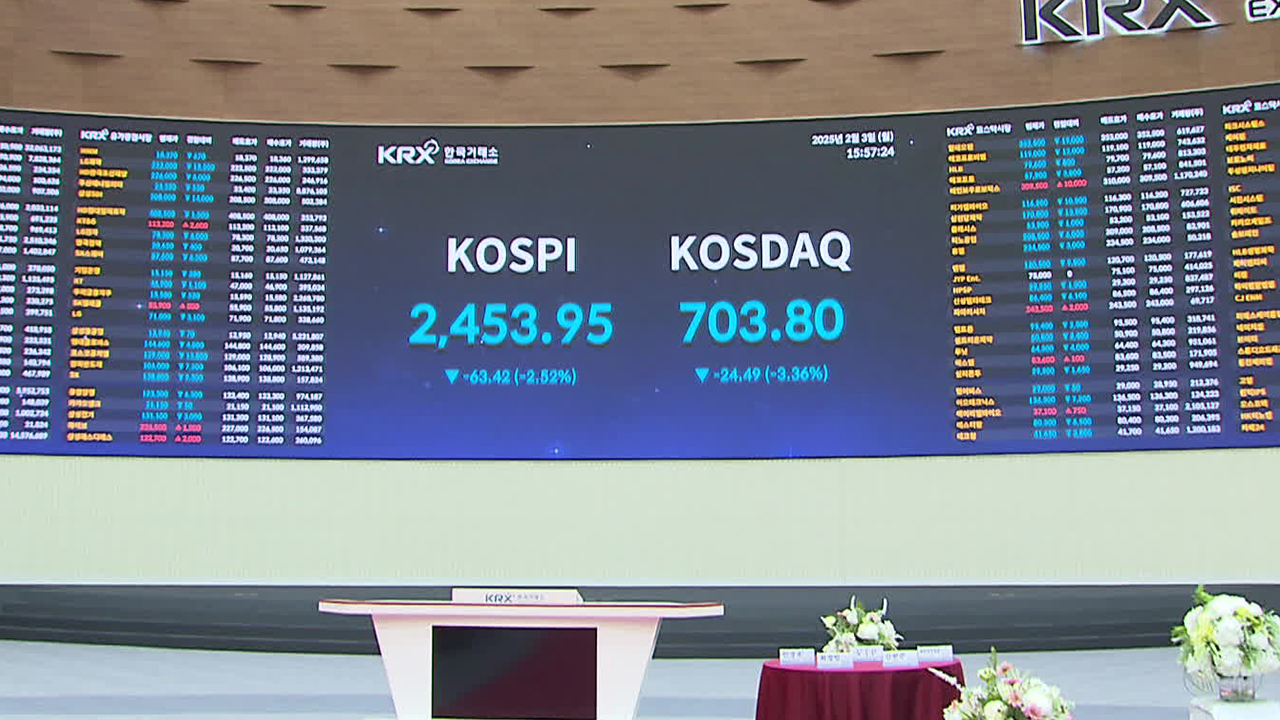
[Anchor]
The shock waves from the tarrif war ignited by U.S. President Donald Trump have hit our financial markets hard.
There are significant concerns that exports may be affected.
Our stock market, which had risen somewhat this year, has returned to square one, and the won-dollar exchange rate has fluctuated around the 1,470 won mark.
First, our Kim Ji-sook reports.
[Report]
The KOSPI is at 2,453 points.
It has dropped more than 2.5% compared to last Friday.
Although it rose nearly 5% in January, it has fallen over 80 points in the last two days, returning to the level of a month ago.
The impact of 'DeepSeek' combined with the shock of the 'tariff war' has become a significant negative factor for the stock market.
Large-cap stocks, particularly in semiconductors, secondary batteries, and automobiles, which have a high proportion of AI and exports, saw significant declines.
The chronic phenomenon of 'small gains' on good news and 'big drops' on bad news has repeated itself.
[Kim Young-hwan/NH Investment & Securities Senior Researcher: "(Korea's) three major export item-related stocks, and those with factories in Canada or Mexico, such as secondary batteries, seem to be significantly impacted."]
The 'tariff war,' which was thought to be a mere threat, has started quickly, and concerns that Korea may be included in the next round of tariffs are reflecting the worries about exports in the stock prices.
Foreign investors have sold a net of over 800 billion won, pushing the won-dollar exchange rate back up.
It has risen to the 1,460 won level for the first time in three weeks, even exceeding 1,470 won during trading.
[Min Kyung-won/Woori Bank Senior Researcher: "(Trump's tariffs) raise concerns about a global trade war, which makes it inevitable that the won, heavily reliant on exports, will be viewed negatively in the market."]
Asian stock markets, which are heavily reliant on exports to the U.S., were also shaken.
The Japanese Nikkei index fell by 2.6%, and the Taiwan Weighted Index dropped by over 3.5%.
China was closed for the Lunar New Year holiday.
This is KBS News, Kim Ji-sook.
The shock waves from the tarrif war ignited by U.S. President Donald Trump have hit our financial markets hard.
There are significant concerns that exports may be affected.
Our stock market, which had risen somewhat this year, has returned to square one, and the won-dollar exchange rate has fluctuated around the 1,470 won mark.
First, our Kim Ji-sook reports.
[Report]
The KOSPI is at 2,453 points.
It has dropped more than 2.5% compared to last Friday.
Although it rose nearly 5% in January, it has fallen over 80 points in the last two days, returning to the level of a month ago.
The impact of 'DeepSeek' combined with the shock of the 'tariff war' has become a significant negative factor for the stock market.
Large-cap stocks, particularly in semiconductors, secondary batteries, and automobiles, which have a high proportion of AI and exports, saw significant declines.
The chronic phenomenon of 'small gains' on good news and 'big drops' on bad news has repeated itself.
[Kim Young-hwan/NH Investment & Securities Senior Researcher: "(Korea's) three major export item-related stocks, and those with factories in Canada or Mexico, such as secondary batteries, seem to be significantly impacted."]
The 'tariff war,' which was thought to be a mere threat, has started quickly, and concerns that Korea may be included in the next round of tariffs are reflecting the worries about exports in the stock prices.
Foreign investors have sold a net of over 800 billion won, pushing the won-dollar exchange rate back up.
It has risen to the 1,460 won level for the first time in three weeks, even exceeding 1,470 won during trading.
[Min Kyung-won/Woori Bank Senior Researcher: "(Trump's tariffs) raise concerns about a global trade war, which makes it inevitable that the won, heavily reliant on exports, will be viewed negatively in the market."]
Asian stock markets, which are heavily reliant on exports to the U.S., were also shaken.
The Japanese Nikkei index fell by 2.6%, and the Taiwan Weighted Index dropped by over 3.5%.
China was closed for the Lunar New Year holiday.
This is KBS News, Kim Ji-sook.
-
-

김지숙 기자 vox@kbs.co.kr
김지숙 기자의 기사 모음
-
이 기사가 좋으셨다면
-
좋아요
0
-
응원해요
0
-
후속 원해요
0










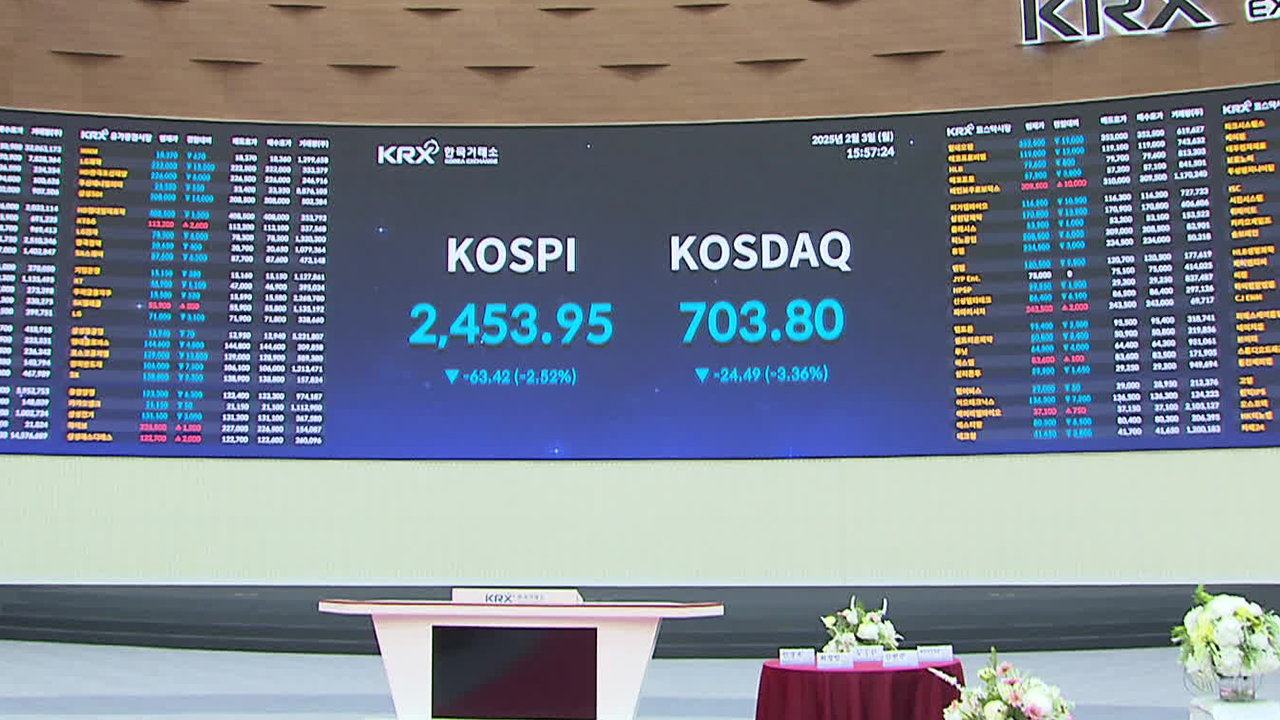
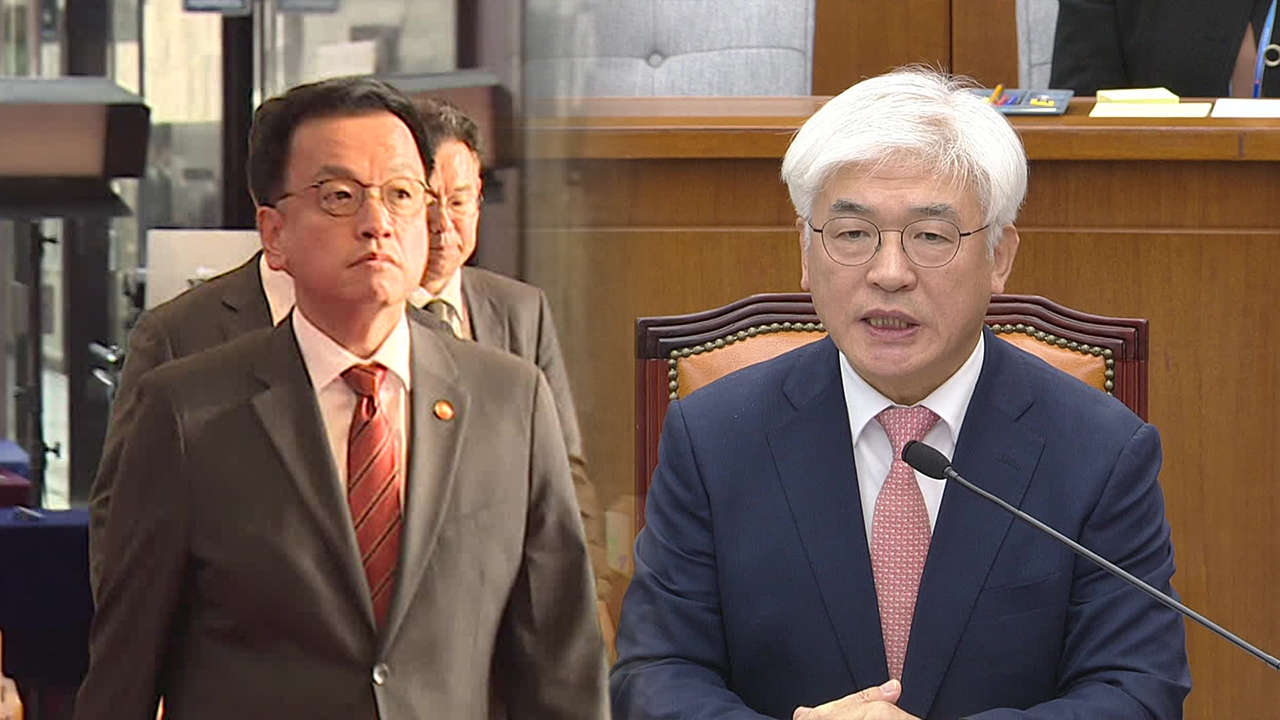
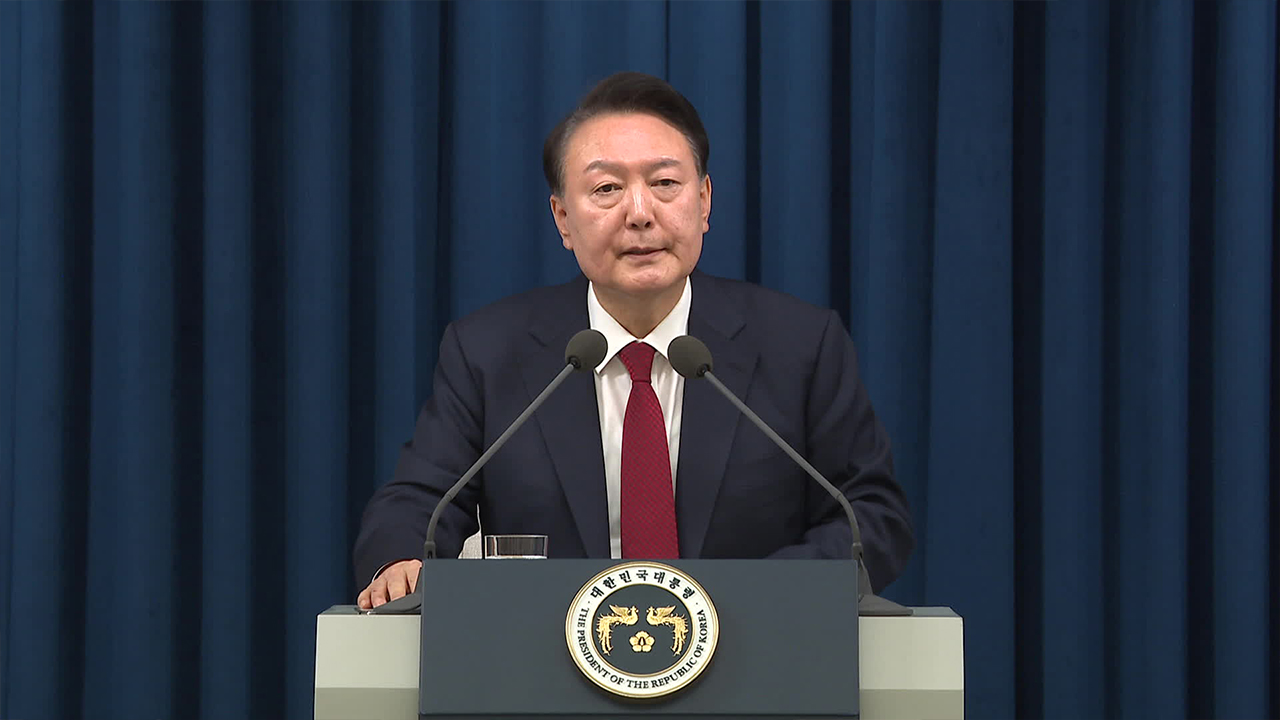
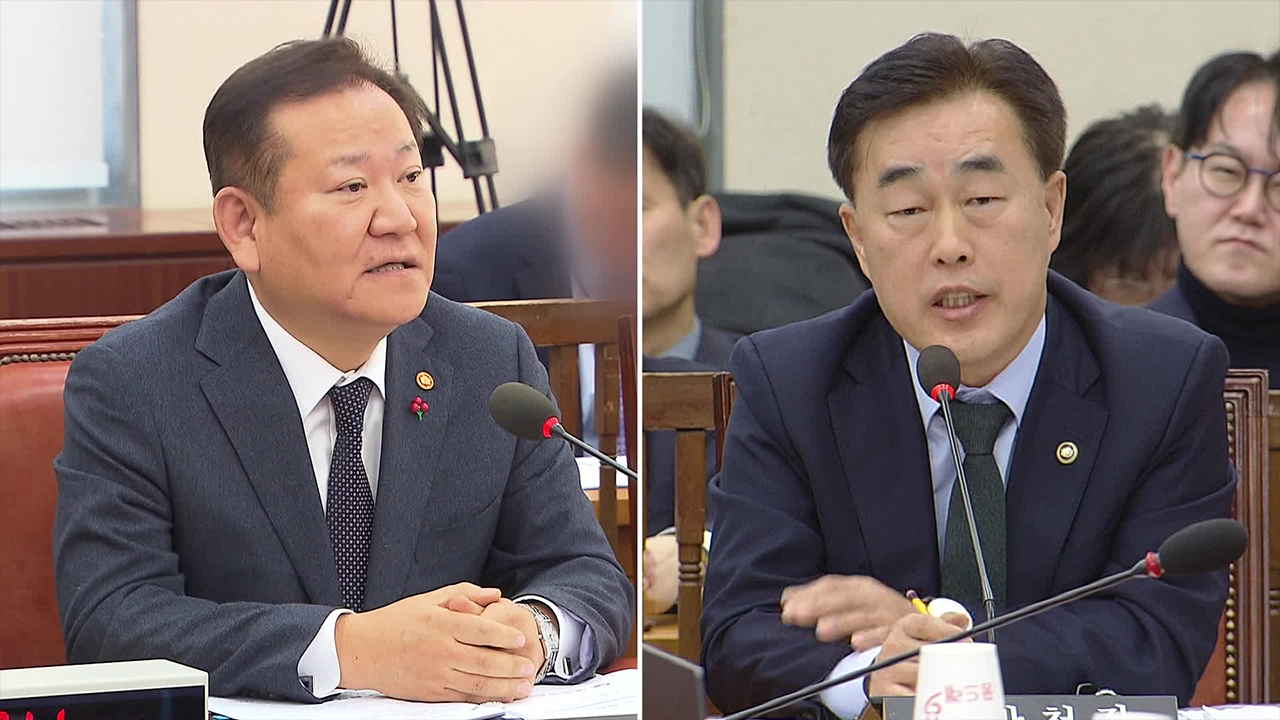

이 기사에 대한 의견을 남겨주세요.